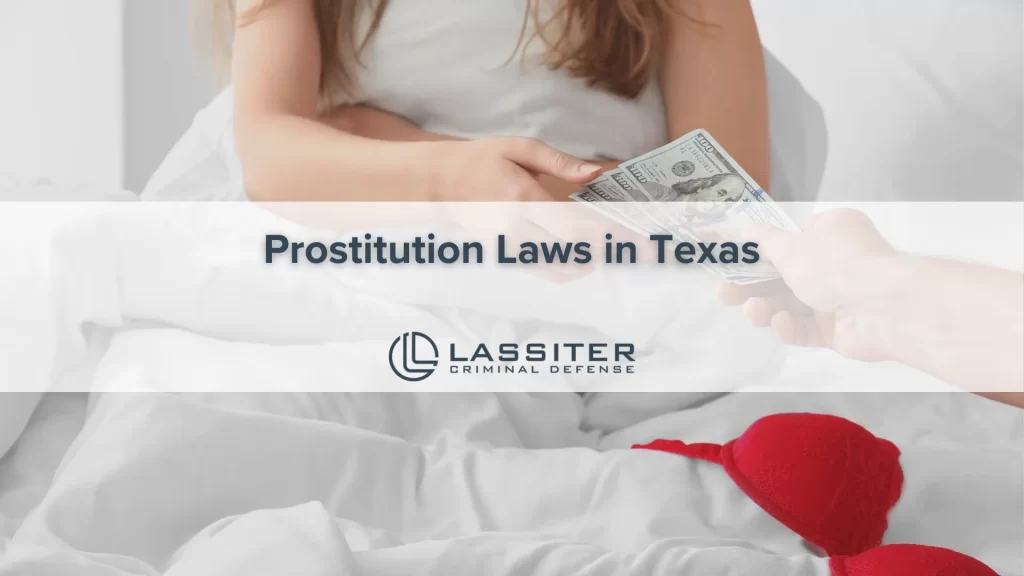
Prostitution laws in Texas cover a wide range of acts, and the consequences someone may face for a prostitution crime can vary substantially.
The following are noteworthy examples of Texas prostitution laws. Although this information is valuable, there’s no substitute for professional legal assistance when you’re facing prostitution charges.
Prostitution
Prostitution laws in Texas have their own subchapter in the Texas Penal Code. Under the law, someone may commit prostitution if they either:
- Knowingly offer to receive payment in exchange for sexual activity
- Knowingly agree to receive payment in exchange for sexual activity
Prostitution is usually a Class B misdemeanor in Texas. According to Chapter 12 of the Texas Penal Code, the penalties for a Class B misdemeanor may include:
- A fine of up to $2,000,
- Up to 180 days in jail, or
- Both.
Prostitution may be a Class A misdemeanor if someone has previously been convicted of prostitution once or twice. Penalties for a Class A misdemeanor in Texas may include:
- A fine of up to $4,000,
- Up to one year in jail, or
- Both.
Prostitution becomes a state jail felony if someone has previously been convicted of prostitution three or more times. Penalties for state jail felonies include:
- 180 days to two years in jail
- A fine of up to $10,000
A related law is Texas Penal Code Sec. 43.021. Solicitation of Prostitution. Someone may commit solicitation of prostitution in Texas if they:
- Knowingly offer to pay a fee in exchange for sexual activity
- Knowingly agree to pay a fee in exchange for sexual activity
Solicitation of prostitution is usually a state jail felony. It becomes a felony of the third degree if someone has previously been convicted of this crime.
It becomes a felony of the second degree if a person pays a fee to engage in sexual activity with someone who is under 18. If the person even thinks the individual is under 18 years of age, the crime is a felony of the second degree.
Promotion of Prostitution
To commit the promotion of prostitution in Texas, someone must engage in certain acts while not acting as a prostitute receiving money for services. Under Texas Penal Code Sec. 43.03, someone not acting as a prostitute themselves may commit the promotion of prostitution if they do either of the following:
- Receive money or another form of property due to an agreement to collect or share in the proceeds of prostitution
- Solicit someone to engage in sexual activity with someone else in exchange for compensation
Promotion of prostitution is usually a felony of the third degree. Penalties for felonies of the third degree in Texas may include:
- Two to 10 years in jail
- A fine of up to $10,000
Promotion of prostitution becomes a felony of the second degree if someone has already been convicted of such a crime. Penalties for felonies of the second degree in Texas may include:
- Two to 20 years in jail
- A fine of up to $10,000
Promotion of prostitution becomes a felony of the first degree if someone commits this crime in any manner involving someone under 18. It doesn’t matter whether they knew the person was younger than 18 years old.
Penalties for felonies of the first degree in Texas may include:
- Life in prison or a minimum prison term of five years and a maximum of 99 years
- A fine of up to $10,000
Aggravated Promotion of Prostitution
Aggravated promotion of prostitution in Texas occurs when someone knowingly:
- Owns,
- Invests in,
- Finances,
- Controls,
- Supervises, or
- Manages a prostitution enterprise with two or more prostitutes.
Under Texas Penal Code Sec. 43.04, this crime is a felony of the first degree.
Compelling Prostitution
Someone may commit the crime of compelling prostitution in Texas under Texas Penal Code Sec. 43.05 if they knowingly commit any of the following:
- Using threats, coercion, or force to cause another person to engage in prostitution
- Causing a child under 18 to engage in prostitution in any way, even if they don’t know the person is a minor
- Causing a disabled person to engage in prostitution in any way, even if they don’t know the person is disabled
According to Texas law, a disabled person in this context is someone who:
- Is older than 13 and
- Has a disability that prevents them from protecting themselves and/or providing for themselves.
Compelling prostitution is a felony of the first degree.
What About Internet Crimes Involving Prostitution?
 Some internet sex crimes in Texas may overlap with prostitution. Examples include:
Some internet sex crimes in Texas may overlap with prostitution. Examples include:
- Texas Penal Code Sec. 43.031. Online Promotion of Prostitution
- Texas Penal Code Sec. 43.041. Aggravated Online Promotion of Prostitution
Someone may commit online promotion of prostitution if they own or operate an “interactive computer service” (such as a website, app, etc.) to promote prostitution. They may use this service to prostitute someone, to solicit prostitution, or to facilitate prostitution.
Online promotion of prostitution is a felony of the third degree in Texas. It becomes a felony of the second degree if someone either:
- Has previously been convicted of online promotion of prostitution or aggravated online promotion of prostitution
- Commits online promotion of prostitution with someone under 18 years of age, regardless of whether they knew they were a minor
Online promotion of prostitution becomes aggravated online promotion of prostitution when an enterprise involves five or more individuals. This crime is a felony of the second degree in Texas. It may be a felony of the first degree if someone either:
- Has previously been convicted of aggravated online promotion of prostitution
- Commits aggravated online promotion of prostitution with someone under 18 years of age, regardless of whether they knew they were a minor
Contact a Texas Prostitution Crimes Defense Lawyer
Solicitation and prostitution laws in Texas can have wide-ranging implications for those facing charges. Violations of some laws are misdemeanors. Other violations are felonies. Thus, details about one’s charges can significantly influence potential penalties.
Don’t delay seeking legal assistance if you’ve been charged with a crime. At the Law Offices of Mark T. Lassiter, a Dallas solicitation and prostitution attorney can protect your rights. The sooner you enlist a lawyer’s help, the sooner they can begin working on your defense. Contact us online or call us at (214) 845-7007 for a free case review.
Related Posts:
Defenses Against Sex Crime Allegations in Texas








